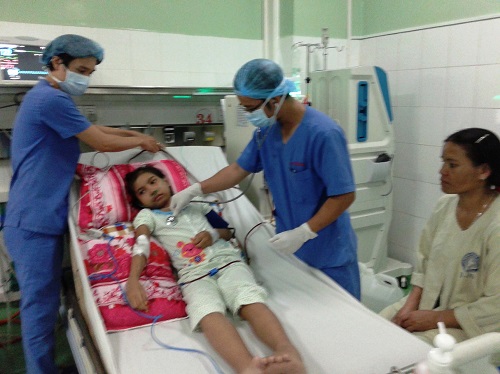Haemodialysis for children available at Maternity and Paediatrics Hospital
On 25 November 2014, doctors at the Da Nang Maternity and Paediatrics Hospital successfully carried out haemodialysis treatment on 12-year-old Tran Thi Hoa from Quang Nam Province’s Dong Giang District. She was the first child to receive this type of treatment in the central region and highlands.
Mrs Alang Thi M., Hoa’s mother, said that in October 2013 Hoa was diagnosed with acute glomerulonephritis, and she was transported to the Hue Central Hospital from the Quang Nam General Hospital for treatment. After 5 months of treatment in Hue, her disease had gone into remission with slight oedema.
 |
| Hoa undergoing her haemodialysis on 10 August |
The following year, Hoa was admitted to Da Nang’s Maternity and Paediatrics Hospital in a coma and suffering from shortness of breath, severe respiratory distress, and heart failure. She was put on a ventilator and blood tests were taken. The test results revealed that she was suffering from multiple organ failure, end-stage renal insufficiency, liver failure, and electrolyte disorders. The hospital’s doctors, therefore, decided to filter Hoa’s blood to help her to live longer. Over the next 48 hours she gradually recovered her health and she was able to breathe on her own without a ventilator.
Since then, Hoa and her mother have been staying at the hospital and Hoa has been receiving haemodialysis treatment twice each week.
Mrs Alang Thi M. said that her daughter’s treatment costs have been covered by health insurance and the city budget because her Co Tu family is very poor. She added that she has been provided with a free lunch and dinner each day in accordance with the city’s support policy for Co Tu people.
Dr Le Van Doan from the hospital’s Paediatrics Ward said that on 8 July, he and his co-workers performed haemodialysis treatment on 8-year-old Hoang L. from Quang Tri Province, who had been diagnosed with end-stage renal insufficiency like Hoa. He added that his hospital had also received 5 other emergency cases of renal failure due to drowning.
Dr Doan remarked that a haemodialysis project was developed when the hospital was built in 2012, but it only started to be implemented last year. There is no kidney ward at the hospital, so haemodialysis treatment is carried out in the hospital’s Recovery–Anti-poison Ward.
He revealed that a haemodialysis centre for children from the central region and highlands is under construction at the hospital which will have 9 haemodialysis machines and fully-trained medical staff.